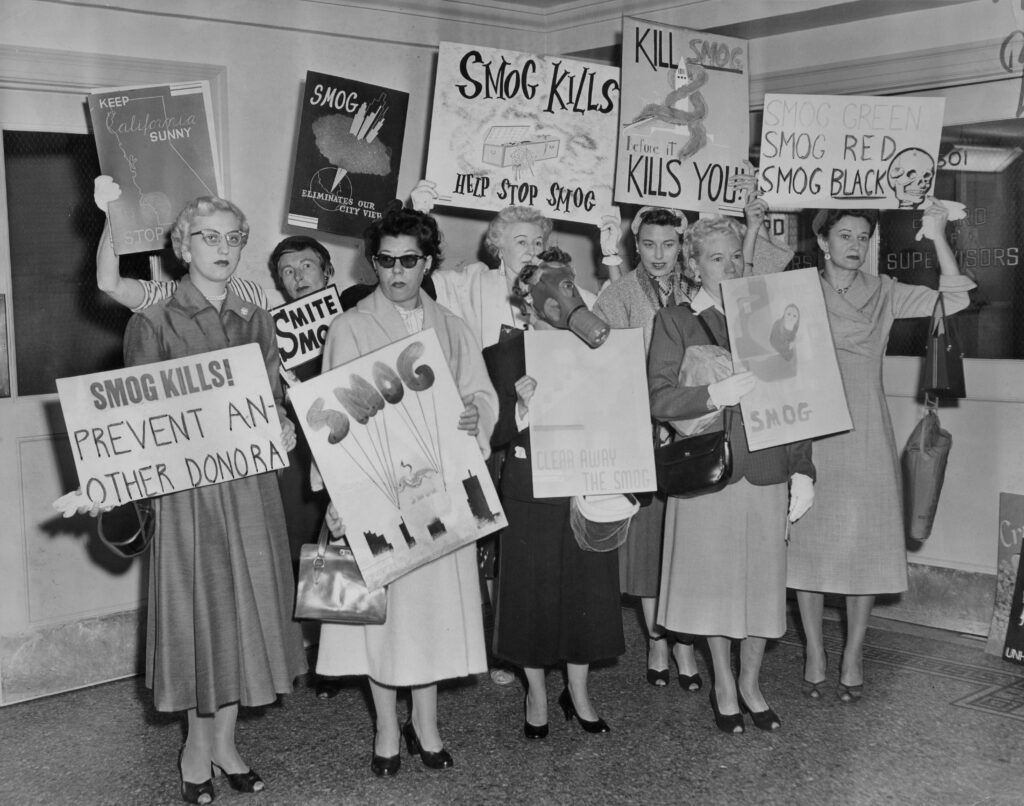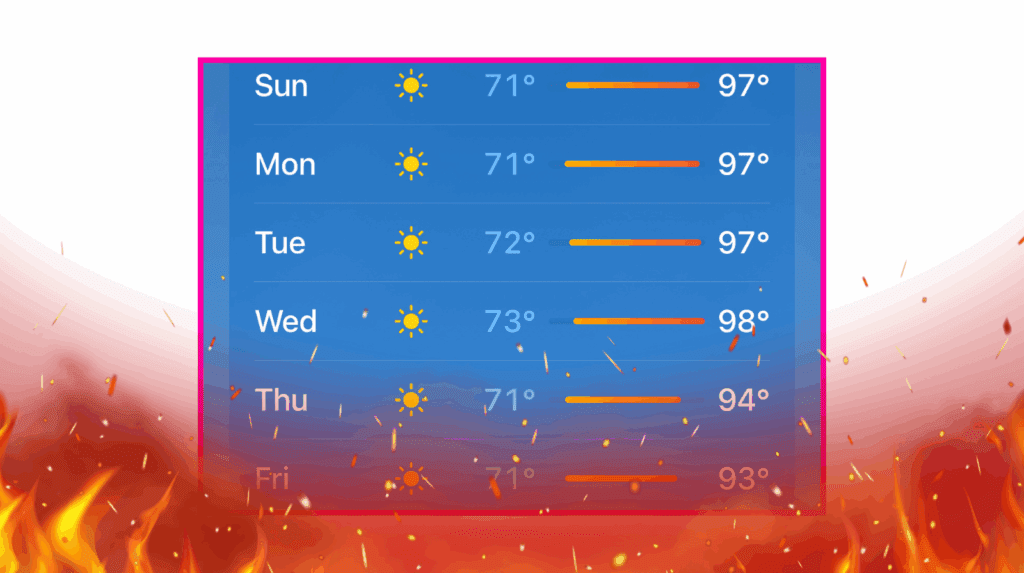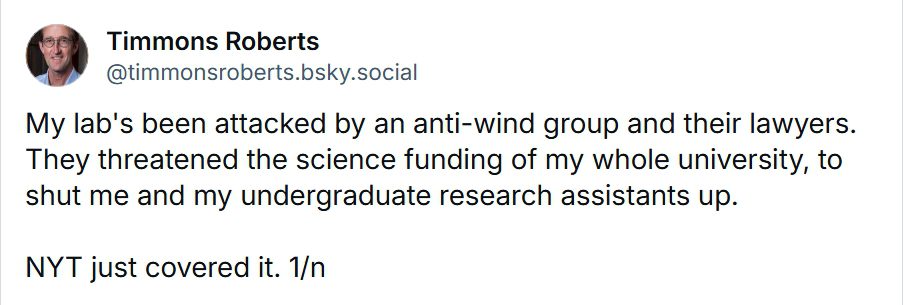How to Dissent? Learn American History
The Drain is a weekly roundup of environmental and climate news from Legal Planet.
It sounds cliché, but when you face a crisis, it helps to remember times that you’ve overcome adversity. That’s the power of history. And it’s one of the reasons I think the new PBS documentary “Clearing the Air: The War on Smog” is crucial to share right now.
In the 1940s, dark, smoky clouds crept over Los Angeles. People covered their eyes and wore gas masks to social functions. Visibility was so bad that cars crashed and LAX was shut down. Concerned citizens, especially mothers, protested and organized. The region enlisted scientists to get to the bottom of the smog problem. When the car companies fought efforts to clean up the air, local and state officials fought back. This campaign led to the catalytic converter, unleaded gasoline, and the (bipartisan) creation of the Environmental Protection Agency.
That’s the hopeful story told in this new PBS documentary “Clearing the Air: The War on Smog” produced by the American Experience out of WGBH, the public TV station in Boston, featuring my UCLA colleagues Mary Nichols and Ann Carlson.

But it will be their last documentary — for now anyway. WGBH just laid off the 13-person team behind the American Experience and announced that no new episodes will be produced until further notice due to budget cuts. This is the direct result — a small but significant example — of the Republican efforts to defund public media and kill the Corporation for Public Broadcasting. I wrote last month about how this could impact local reporting on climate, the environment, and extreme weather events. Now, the $1.1 billion in cuts are already affecting our ability to tell American history. Work on six films that had been commissioned has now ceased, reports NYT critic Mike Hale, who had high praise for the smog documentary. “Recalling a time when pollution felt imminently apocalyptic,” he writes, “the film implicitly calls to mind climate change, the present man-made environmental crisis.”
Pollution is still killing us, of course. Air pollution from oil and gas causes more than 90,000 premature deaths and sickens many more, a new study finds. And the US government is trying to stop regulating climate pollution altogether.
So, watch this film to remember past wins. It serves as a small act of dissent, same as donating to local public media stations. Telling, learning, and sharing American history when those in power want it erased from museums, schools, and public broadcasts feels like an important act of resistance.
This week there’s an upsurge of another important chapter in American history. It was 20 years ago that Hurricane Katrina struck along the Gulf Coast as a Category 3 hurricane and then became a man-made disaster due to the failure of leadership and murderous incompetence. Lots of media outlets are marking the anniversary with conversations about the lessons we have and have not learned. This NPR special series is particularly good. NRDC made Katrina the subject of its first podcast. And Climate Central drew some new conclusions about how climate change indeed intensified Hurricane Katrina, using new methodology to analyze the wind and ocean conditions.

This piece in The Guardian today finds longtime climate journalist Mark Hertsgaard in conversation with music superstar Jon Batiste about climate change, his hometown of New Orleans, and his brand-new climate anthem. “It’s a warning, set to a dance beat,” Batiste says about the song, “Petrichor,” with its toe-tapping hambone rhythm and a not-so-subtle refrain.
Help me, Lord
They burning the planet down
No more second linin’ in the street
They burning the planet down, Lord
Help me, Lord
No more plants for you to eat
Help me, Lord
They burning the planet down
Hot coals underneath your feet
Good god
They burning the planet down, Lord
Help me, Lord
“Petrichor” refers to the smell that rises from parched soil as it’s finally hit with rain, Batiste says. The song sits on an album called “Big Money” with themes of mortality and ecology. New Orleans itself is “a warning” that climate-driven disasters “can happen anywhere, and there’s many places where this has happened,” Batiste says. The Guardian interview is part of the international media collaboration Covering Climate Now, which has been focused this year on social science that shows 80 to 89% of the world’s population wants to see stronger climate action. Batiste counts himself as part of the 89%. “I really want people to keep dancing and stay optimistic — but know that we gotta, we gotta, move,” Batiste says.
Welcome to The Drain, a roundup of environmental and climate news… and songs, I guess. I’m going to start including a Song of the Week in each installment of The Drain to gather a climate playlist. We need more climate anthems like this one.
Meanwhile, FEMA leadership is not learning any lessons. FEMA employees from around the country signed an open letter to members of Congress this week to oppose the hollowing out of that agency. The FEMA Katrina Declaration is hosted on the website of Stand Up For Science — the same organization that hosted an open letter from EPA employees (whistleblowers more or less) fighting cuts and abandonment at that agency’s mission.
In this case, three dozen FEMA employees signed their full names to the letter, Brianna Sacks reports for the Washington Post. Staffers say that since January, they have been operating under leaders “who lack the legal qualifications and authority to manage FEMA’s operations.” (What’s more, the administration is now barring disaster aid groups from helping undocumented immigrants, Sacks reports, leaving the most vulnerable victims without even religious and faith-based charity.)
FEMA responded only by suspending those 36 employees who signed their name, Maxine Joselow writes for the New York Times. “The emails did not provide a reason for the decision.” Heck of a job there, FEMA.
Hot Hot Heat

The biggest heat wave of the year arrived in Southern California this past week, hitting us with triple-digit temperatures and heat advisories. I took my 9-year-old to Soak City, the water park. It sure seemed like half of Los Angeles County did the same judging from the soul-crushing lines.
If you tossed and turned in this recent heat wave, you can thank climate change for those stifling muggy nights. And you should get used to it, write Janet Wilson and Tallulah Rector in the Desert Sun.
When the heat spikes during the summer, we “morph into a two-party state: the cooled and the cooked,” argues author Jeff Goodell in a new NYT Opinion piece about the widening inequality around water, shade and A/C in a warming planet. The “cooked” include delivery drivers, construction workers, and food-industry workers, like BBQ pit-masters.
But all of us may be slowly simmering and aging faster. Scientists in Hong Kong analyzed 15 years’ worth of health data from nearly 25,000 adults in Taiwan and found that two years of exposure to heat waves could speed up a person’s so-called biological aging by eight to 12 extra days.
Good News
The U.S. is miraculously still on track to build a record-breaking amount of new solar power capacity this year. “Roughly 12 gigawatts of new solar capacity joined the grid in the first half of the year, and 21 gigawatts more are slated for completion by the end of the year,” according to an EIA survey reported on by Julian Specter. You can also hear Bill McKibben talk about solar power — “the most important good story” on Chris Hayes’ podcast.
A federal judge sided with the Miccosukee Tribe and said the ICE must stop sending detainees to the detention facility known as “Alligator Alcatraz” and begin dismantling it within 60 days, citing a lack of environmental reviews. (Florida officials have already appealed.)
With its first-in-the-nation law, Colorado became the first state to require putting yellow warning labels on gas appliances pointing consumers to evidence about the harms of cooking with gas. Appliance manufacturers are suing, Alison F. Takemura reports.
Los Angeles and California
California regulators from multiple agencies released their long-awaited report, requested by Gov. Newsom, outlining ways the Golden State can continue to cut vehicle emissions, and promise to accelerate clean air efforts even as the federal government attempts to derail them. The report focuses on 6 areas.
Days later, the US Justice Department’s Civil Rights Division announced it had opened an investigation into CAL EPA, including the California Air Resources Board to “determine whether it may be engaged in employment practices that discriminate based on race, sex, color, and national origin.”
More to the point, the Trump administration plans to try to rescind heavy-duty vehicle inspection and maintenance mandates set by California, according to a proposal announced on Monday. The EPA argues that the current California requirements violate federal authority over foreign commerce, Jennifer Hijazi reports for Bloomberg. It’s already suing over California’s clean trucks rule.
Phillips 66 may try to shirk its responsibilities to clean up a “lake of hydrocarbons” that has accumulated under the Los Angeles-area refinery that is slated for closure later this year, Aaron Cantú reports at Capital & Main. Advocates in Southeast LA County are worried that the polluted stretch of land could be prepped for development before its properly cleaned and remediated.
Sammy Roth slams Newsom in his Boiling Point column for (mostly) being the reason that California is backsliding on climate progress, though a more sympathetic Sen. Henry Stern qualifies it as “a begrudging acquiescence, or just ugly practicality.”
And Hailey Branson-Potts asks whether the Darden Clean Energy Project, given fast-track approval by the California Energy Commission in June, sidelines neighboring residents around Fresno. As she details, the Darden developer is required to provide community benefits so this project will be a good test case for how those benefits flow.
A coalition of businesses and other groups wrote lawmakers supporting efforts to quickly act to extend California’s cap-and-trade policy and prevent uncertainty. My Legal Planet colleague Ethan Elkind writes that lawmakers have an opportunity to expand the benefits with cap-and-trade reauthorization by expanding the California Climate Credit that sends money back to ratepayers.
Researchers have identified the nation’s 8,700 or so cattle feeding operations, and that map shows California has more of them than any other state, Susanne Rust and Sean Greene report. The researchers at the University of Michigan and UC Santa Barbara say their data will “allow local governments and nongovernmental organizations to set targeted environmental, health and economic policies for their regions.”
CalRecycle rolled out a new draft of its rules for implementing the state’s landmark single-use plastics law and opened the public comment period on Friday, with a public hearing set for Oct. 7.
And here are the “best to worst” freeways in Southern California, according to the L.A. Times, ranked for aesthetics as well as speed, delays, and fatal crashes. Though I’m not sure that ranking freeways makes much sense. Freeways are not mayonnaise. None of them are the best.
Energy

ICYMI somehow, the administration sent a stop work order to Revolution Wind, a major wind energy project off the coast of Rhode Island that is fully permitted and 80% built. The company, Ørsted, says 45 out of 65 wind turbines are installed. Evan Halper at the Washington Post writes that the administration is laying plans to block another wind project in Maryland, and that this broad assault on the industry is unnerving investors in renewable energy.
Meanwhile, a law firm representing opponents of offshore wind is demanding that Brown University retract research that details links between the fossil fuel industry and anti-wind groups, calling the research “false and injurious,” Lisa Friedman reports in the New York Times.
And all the while household power bills have risen 10% since President Trump entered the White House, according to an Aug 18 report from advocacy group Climate Power. That’s moving in the opposite direction from Trump’s campaign pledges to slash prices. Energy Secretary Chris Wright admitted to Politico last week that he knows rising energy prices could be a political challenge for the GOP ahead of next year’s midterm elections. Even red Texas faces an energy shortage to keep its economy humming and is being hurt by this anti-renewable obsession.
Why has electricity gotten more expensive in recent years anyway? “The answer, despite what the president might say, isn’t renewables,” Robinson Meyer writes at Heatmap News. “It has far more to do with the part of the power grid you’re most familiar with: the poles and wires outside your window.”
One in three California parents of young kids struggle to afford their utility bills, according to a statewide survey by Stanford. It found that when parents have trouble making ends meet, their children’s well-being and development suffer.
Other things worth your time
An independent institute called PSE Healthy Energy just released a “Methane Risk Map” that illustrates the spread of health-harming pollutants like benzene and toluene that also emanate from methane super-emitter events.
One day in July, more than 100,000 residential batteries across California simultaneously discharged to the grid for two hours. “They were part of a coordinated virtual power plant test — and according to PG&E, the resulting 539-megawatt dispatch was equivalent to the output of a mid-size natural gas plant,” Maeve Allsup reports at Latitude Media.
The eight Latin American nations that are home to the Amazon Basin have pledged support for Brazil’s Tropical Forest Forever Facility (TFFF), a new global fund that will seek to channel finance for rainforest conservation. Climate Home News calls it “a major vote of confidence for one of Brazil’s flagship initiatives as host of the COP30 UN climate talks in November.”
Brazilian diplomat and COP30 President André Corrêa do Lago wrote a public letter addressing key issues in preparation for the climate conference, warning that “geopolitical and economic obstacles are raising new challenges to international cooperation — including under the climate regime.”






Reader Comments